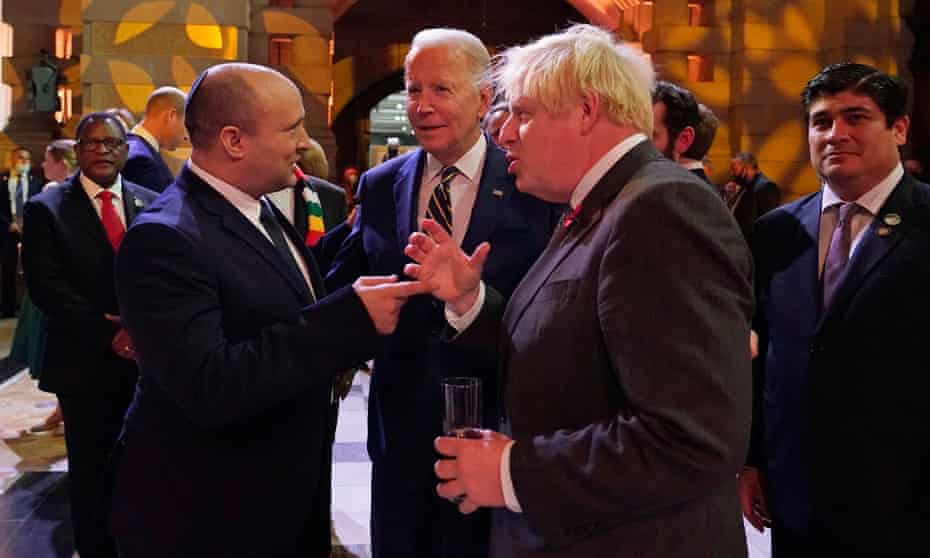Cop26: welcome to Glasgow – the world is watching
Now most countries have experienced the climate crisis as wildfires, floods or heatwaves, leaders know they must deliver

For a conference that had already been delayed by a year, perhaps this was a fitting start for the delegates and world leaders who made their way to Cop26 with a mission to save the planet.
It was raining. There was no shelter. And the thousands of participants who had come to the UK from all four corners of the globe faced the mother of all queues to get inside.
Welcome to Glasgow.
This was not the most promising start for a conference seen by most observers as a last chance to save the world from climate change. But perhaps the wind and grey would help to focus minds on the task at hand.
After all, the stakes have never been higher. The political leaders here all know that they’re on the hook.
In the past they may have quibbled over the science, or questioned the figures. But this was a year in which the climate crisis came into more people’s lives than ever before. Many of their countries experienced record temperatures, wildfires, droughts and floods.
Outside the conference, the demonstrators who chanted and sang were a constant reminder that there is a generation of people with a much clearer sense of what is going on – and a willingness to blame those who fail to assume responsibility and sort it out.
In the pavilion, a makeshift village near the entrance to the site where NGOs, countries and corporations have set up pitches, there was a lifesize model of polar bears stuck on ice at the Tuvalu stand, and a sculpture of a penguin hanging itself. On every stand people were eager to talk and communicate the urgency they all felt.
But it was in the blue zone, right at the centre of the conference, where the proper meetings would take place. And here, beyond the protesters and the queues and the polar bears, past the crowds of delegates with lanyards and briefcases, deep in the heart of the conference there was an undeniable sense of purpose as the leaders began their speeches and things finally got under way.
What most of them would have made of Boris Johnson’s address is anyone’s guess. The host of the event, the ringmaster of this diplomatic circus, the UK prime minister started his speech talking about the city’s most famous fictional son: James Bond, likening the situation facing the world to a ticking timebomb.
“We might not feel like James Bond, or look like James Bond, but Cop26 must be the start of defusing that bomb. Yes, it is going to be hard, but yes, we can do it,” he said.
It was a step up, perhaps, from the speech he gave to the UN general assembly a month ago, in which he referenced the Muppets’ character, Kermit the Frog.
It was the prime minister of Barbados, Mia Amor Mottley, who better captured the sense of urgency.
She accused countries of making promises based on technology that still doesn’t exist. “This is at best reckless and at worst dangerous,” she said.
“Our people are watching, and our people are taking note. And are we really going to leave Scotland without the resolve and the ambition that is sorely needed to save lives and to save our planet?”
The UN secretary general, Antonio Guterres, was emphatic too.
“We are digging our own graves,” he said, as he urged G20 countries responsible for 80% of emissions to return to Cop every year with new commitments, rather than every five years as before.
He also spoke about the importance of reaching the $100bn a year target promised in Paris in 2015.
And he reminded those listening about the children, the next generation, who were watching. “The climate action army – led by young people – is unstoppable. They are larger. They are louder. And, I assure you, they are not going away,” he said.
Once again, it was the veteran broadcaster, Sir David Attenborough, who somehow found the words that got delegates out of their seats.
He told the conference that humans were the “greatest problem solvers to have ever existed on Earth”, and it not beyond the wit of man to “turn this tragedy into a triumph”.
“We now understand this problem, we know how to stop the number rising and put it in reverse,” he said.
Some of the most desperate calls for help came from poorer countries, many of whom have populations most at risk from escalating temperatures.
Sonam Phuntsho Wangdi, from the Kingdom of Bhutan, who is chair of the least developed countries group at UN climate change negotiations, which represents the world’s poorest 48 nations, said “words alone are not enough”.
“We cannot leave Glasgow without strong commitments that will ensure the survival of the billion people living in the [least developed countries].”
Young Kenyan activist Elizabeth Wathuti closed this part of the ceremony. “I have seen with my own eyes three young children crying at the side of a dried-up river after walking 12 miles with their mother to find water,” she said.
President Biden was one of a few delegates who appeared to nod off as the speeches went on. He showed up late after flying into Edinburgh earlier in the day and being driven to Glasgow in a motorcade.
At least he got there, unlike veteran correspondent Wolf Blitzer from CNN who was sent to Edinburgh to report on the conference.
“Should’ve gone to Glasgow,” said Specsavers’ Twitter account.
